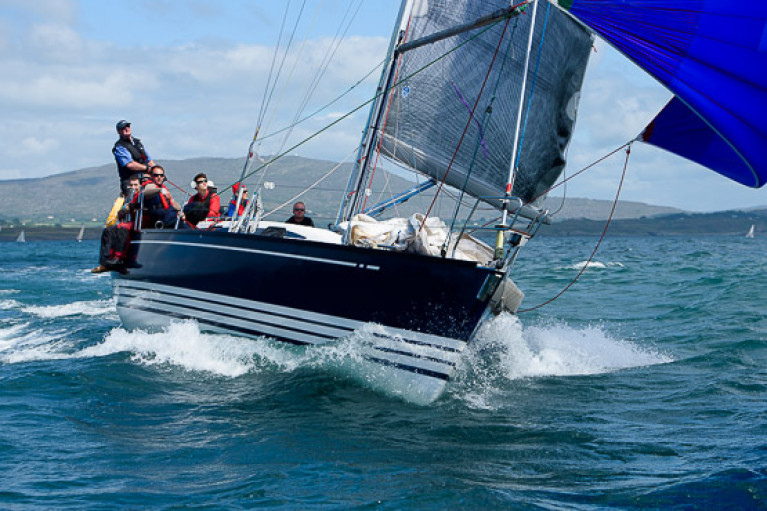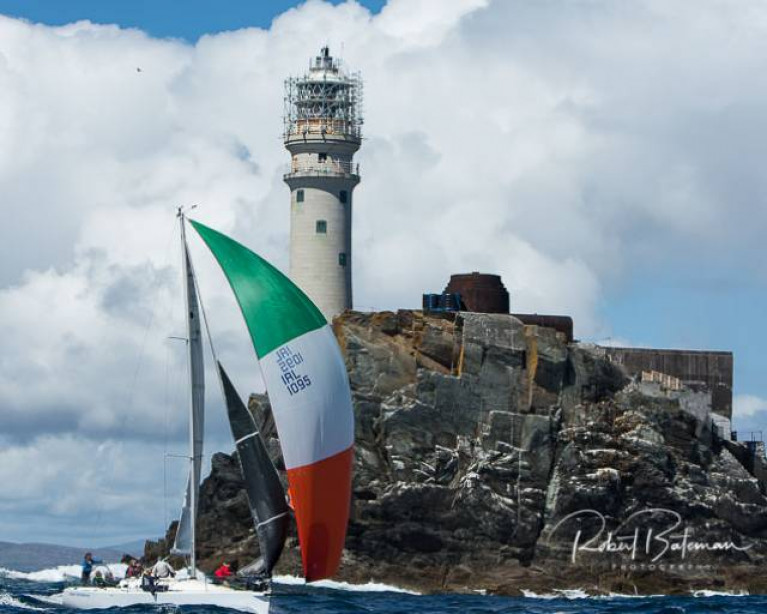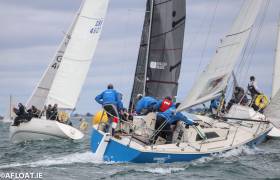Displaying items by tag: Calves Week
The overall lead changed in two of the four IRC classes on the final day of Schull Harbour Sailing Club's Calves Week 2021 Regatta that sees East coast visitors winning in Division Zero/One and Two.
The top three IRC divisions of Calves Week were each won by crews who took three wins out of four for overall victory in West Cork this week.
There were no last race nerves today as Frank Whelan's new J/122 Kaya chalked up his third win to give the Greystones Sailing Club entry a comprehensive win of zero/one. Whelan finished on three points and a five-point margin over the modified 1720 sportsboat Antix Beag skippered by Anthony O'Leary of Royal Cork Yacht Club.
Brian Jones' J/109 Jelly Baby, also from Royal Cork Yacht Club, maintained his third place in the 12-boat class one fleet.
The four-day Calves Week Regatta had a mix of courses taking in the Fastnet Rock on Wednesday and many of Carbery's Hundred Isles, together with laid courses in Roaringwater Bay and it is one of Irish sailing's most popular fixtures on the south coast.
Royal Cork's Cortegada overhauled by Howth's Red Cloud
 George Radley's RCYC Half Tonner Cortegada lost out on the final day to a Dublin J/80 Photo: Thomas Newman
George Radley's RCYC Half Tonner Cortegada lost out on the final day to a Dublin J/80 Photo: Thomas Newman
After a series-long lead, George Radley's RCYC Half Tonner Cortegada was overtaken by Norbert Reilly's J/80 Red Cloud from Howth Yacht Club in the final race. A third race win today for Reilly gave him overall victory by four points. Third overall is Flor Riordan's Elan 31 Three Cheers in the nine boat class two fleet.
 Class Two yachts round the weather mark in day three of Calves Week Regatta Photo: Thomas Newman
Class Two yachts round the weather mark in day three of Calves Week Regatta Photo: Thomas Newman
Baltimore Dehler 34 is class three winner
A third race win for Patrick Collins Dehler 34 Ealu from Baltimore Sailing Club sealed class three for the West Cork entry ahead of Courtown Sailing Club Quarter Tonner Snoopy (Martin Mahon). Peter O'Leary's First Class 8, Repo8 from Crookhaven Sailing Club is third.
 Rob O'Reilly's quarter tonner BonJourNo! Part Deux from Monkstown Bay Sailing Club regaind the lead in the final race Photo: Bob Bateman
Rob O'Reilly's quarter tonner BonJourNo! Part Deux from Monkstown Bay Sailing Club regaind the lead in the final race Photo: Bob Bateman
Quarter tonner Bon journo claims class four prize
Early class four regatta leader Rob O'Reilly's quarter tonner BonJourNo! Part Deux from Monkstown Bay Sailing Club in Cork Harbour won the final race today to move back to the top of the leaderboard deposing overnight leader Rene Wubben's Albin Ballad Seven Whistler from Waterford Harbour Sailing Club. Richard Hanley of Kinsale Yacht Club in the GK 24 Saoirse finished in third place.
 Frank Caul's Grand Soleil 37 Prince of Tides Photo: Thomas Newman
Frank Caul's Grand Soleil 37 Prince of Tides Photo: Thomas Newman
White sail victory for Prince of Tides
Frank Caul's Grand Soleil 37 Prince of Tides from Royal Cork Yacht Club won the white sails IRC fleet with local Schull Harbour Sailing Club's Indulgence, a Dehler 36 skippered by Aidan Heffernan in second. Bryan Heffernan's Aisling, a Dufour 365, also from Schull Harbour Sailing Club, was third.
Results are here
Stronger winds on the third day of Schull Harbour Sailing Club's Calves Week 2021 Regatta has swept a new leader to the top of the biggest IRC Class.
The solid 16-knot breeze also brought changes to the class three and four leaderboards.
With another race win and on a six points total, Frank Whelan's new J/122 Kaya from Greystones Sailing Club now leads class zero/one into Friday's final day of racing in West Cork with a two-point margin over the modified 1720 sportsboat Antix Beag skippered by Anthony O'Leary of Royal Cork Yacht Club.
Brian Jones' J/109 Jelly Baby, also from Royal Cork Yacht Club, stays third in the 12-boat class one fleet.
The four-day Calves Week Championships has a mix of courses taking in the Fastnet Rock and many of Carbery's Hundred Isles, together with laid courses in Roaringwater Bay and it is one of Irish sailing's enduring fixtures.
The fleet enjoyed some great sailing for race three as described in the short vid (below) by North Sails Ireland’s Maurice O’Connell onboard Kaya in class zero/one
Cortegada leads class two by a point
George Radley's RCYC Half Tonner Cortegada continues to lead class two, but Norbert Reilly's J/80 Red Cloud from Howth Yacht Club has moved up to second and whittled down Radley's lead to just a single point. Third is Flor Riordan's Elan 31 Three Cheers in the nine boat class two fleet.
 Class Two yachts round the weather mark in day three of Calves Week Regatta Photo: Thomas Newman
Class Two yachts round the weather mark in day three of Calves Week Regatta Photo: Thomas Newman
Baltimore Dehler 34 takes class three lead
Another race win for Patrick Collins Dehler 34 Ealu from Baltimore Sailing Club gives him the lead from Courtown Sailing Club Quarter Tonner Snoopy (Martin Mahon). Peter O'Leary's First Class 8, Repo8 from Crookhaven Sailing Club is third.
Seven Whistler tops class four
Rene Wubben's Albin Ballad Seven Whistler from Waterford Harbour Sailing Club has moved up from third to first place in class four after winning the third race. Wubben has a three-point lead over one-time leader Rob O'Reilly's quarter tonner BonJourNo! Part Deux from Monkstown Bay Sailing Club in Cork Harbour on nine points. Richard Hanley of Kinsale Yacht Club in the GK 24 Saoirse is also on nine points in third place.
There's no change in the overall scores in White Sails IRC that continues to be led by Frank Caul's Grand Soleil 37 Prince of Tides from Royal Cork Yacht Club. Second is Schull Harbour Sailing Club's Indulgence, a Dehler 36 skippered by Aidan Heffernan. The Sovereign 400 VSOP skippered by Don McCarthy of the host club lies third.
Racing concludes on Friday.
See regatta preview, entries and race schedule here
Results are here
The modified 1720 sportsboat Antix Beag skippered by Anthony O'Leary of Royal Cork Yacht Club continues to lead the biggest class of Schull Harbour Sailing Club's Calves Week 2021 Regatta.
After Wednesday's race around the Fastnet Rock, O'Leary has managed to stay in front of some strong visiting boats to West Cork (including the reigning ISORA Champion Rockabill VI), but points are tight at the top of Class One with one point separating the top three overall and two races left to sail.
O'Leary is on four points, but Frank Whelan's new J/122 Kaya from Greystones Sailing Club is now into second place but on the same five points as Brian Jones J/109 Jelly Baby from Royal Cork Yacht Club, who stays third in the 12-boat class one fleet.
Cortegada continues to lead class two
RCYC Half Tonner Cortegada, owned by George Radley, continues to lead Flor Riordan's Elan 31 Three Cheers in nine boat class two and now has a two-point cushion. Norbert Reilly's J/80 Red Cloud from Howth Yacht Club has leapfrogged the Sunfast 32 Bad Company skippered by Frank Desmond for third.
Quarter Tonner Snoopy in charge of class three
Courtown Sailing Club Quarter Tonner Snoopy (Martin Mahon) also still leads Class Three IRC. Patrick Collins Dehler 34 Ealu from Baltimore Sailing Club is now second and ahead of Peter O'Leary's First Class 8, Repo8 from Crookhaven Sailing Club.
BonJourno tops class four
Rob O'Reilly's quarter tonner BonJourNo! Part Deux from Monkstown Bay Sailing Club in Cork Harbour has taken the lead of five boat class four, toppling early leader Richard Hanley of Kinsale Yacht Club in the GK 24 Saoirse now in second. Rene Wubben's Albin Ballad Seven Whistler from Waterford Harbour Sailing Club stays third.
White Sails IRC is led by Frank Caul's Grand Soleil 37 Prince of Tides from Royal Cork Yacht Club from Schull Harbour Sailing Club's Indulgence, a Dehler 36 skippered by Aidan Heffernan. The Sovereign 400 VSOP skippered by Don McCarthy of the host club lies third.
Racing continues until Friday.
See regatta preview, entry list and race schedule here
Results are here
Despite a strong fleet of visiting yachts to the West Cork coast for the opening race of Schull Harbour Sailing Club's Calves Week 2021 Regatta, Munster entries lead in all IRC divisions except one after a round the islands race for all classes today.
The customised 1720 Antix Beag skippered by Anthony O'Leary of Royal Cork Yacht Club leads the biggest class after the first race of four scheduled this week.
The modified sportsboat leads from Leslie Parnell's First 34.7, Black Velvet from the Royal Irish Yacht Club from Dublin Bay who also made the most of the light and bright conditions off Schull Harbour. Recent J/109 coastal race performer Jelly Baby skippered by Brian Jones of Royal Cork Yacht Club lies third in the 12 boat class one fleet.
Cortegada leads class two
RCYC Half Tonner Cortegada owned by George Radley leads Flor Riordan's Elan 31 Cheers in nine boat class two. Third is Radley's club mate, the Sunfast 32 Bad Company skippered by Frank Desmond.
Courtown Sailing Club's Quarter Tonner Snoopy leads in class three
Courtown Sailing Club Quarter Tonner Snoopy (Martin Mahon) leads Class Three IRC from Peter O'Leary's First Class 8, Repo8 from Crookhaven Sailing Club. In third place in the seven boat fleet is Great Island Sailing Club's Sigma 33 Musketeer skippered by Billy Burke.
GK 24 tops class four
Five boat Class four is led by the GK 24 Saoirse sailed by Richard Hanley of Kinsale Yacht Club. In second place is Rob O'Reilly's quarter tonner BonJourNo! Part Deux from Monkstown Bay Sailing Club in Cork Harbour followed by Rene Wubben's Albin Ballad Seven Whistler from Waterford Harbour Sailing Club.
White Sails IRC is led by Frank Caul's Grand Soleil 37 Prince of Tides from Royal Cork Yacht Club from Schull Harbour Sailing Club's Indulgence, a Dehler 36 skippered by Aidan Heffernan. The Sovereign 400 VSOP skippered by Don McCarthy of the host club lies third.
Racing continues tomorrow (Wednesday) with a scheduled race around the Fastnet Rock.
See regatta preview, entry list and race schedule here
Results are here
Rockabill VI to Defend Calves Week Title With New Challengers on the Water in West Cork
Paul O'Higgins' JPK 10.80 Rockabill VI, whose victory in both divisions in 2019 clinched him the overall title, will defend on Tuesday in the first of four races to decide Calves Week Regatta 2021 in West Cork.
A fleet of 36 IRC racers will compete in four divisions (see entries below). A 12-boat Class One, in particular, is one of the biggest IRC gatherings of the Irish sailing season so far and follows another successful south coast regatta, the Sovereign's Cup at Kinsale in June.
It's a positive turnaround for Commodore Sean Norris and Schull Harbour Sailing Club who were forced to cancel 2020's regatta for obvious reasons.
So positive, in fact, that the popular event reached its entry limit in June.
The Irish Cruiser Racing Association's Boat of the Year rankings includes Calves Week as one of the events of its points series for the annual award.
Calves Week schedule
The format for the four-day regatta is three daily 'Round the Islands/Marks' races as well as a Round the Fastnet Race on Wednesday morning.
Starts each day are at 11.30 am at Copper Point or inside Schull Harbour as are the finish lines.
 Calves Week 2021 Schedule
Calves Week 2021 Schedule
J/122 Kaya debuts in Schull
2018 titleholder Frank Whelan is also back in Class One even though his winning Grand Soleil “Eleuthera” has been replaced with a new Greystones' based J122 Kaya, that debuted on the East Coast this season in ISORA coastal racing.
 The Greystones' based J122 Kaya
The Greystones' based J122 Kaya
 Leslie Parnell's 34.7 Black Velvet Photo: Afloat
Leslie Parnell's 34.7 Black Velvet Photo: Afloat
Also ready to challenge in the big boat class is Royal Cork's Brian Jones the winner of Saturday's Kinsale to Baltimore feeder race in his J/109 Jelly Baby. It's not Jones' only victory this season either, the family crewed boat also won Kinsale's Fastnet Rock Race in June too.
 Family crewed J109 Jelly Baby from Royal Cork Photo: Bob Bateman
Family crewed J109 Jelly Baby from Royal Cork Photo: Bob Bateman
 Calves Week 2021 Class 1 IRC Entries: 12
Calves Week 2021 Class 1 IRC Entries: 12
George Radley's Half Tonner Cortegada will have to deal with two J/80 sportsboats, one local and one from Howth, as well as the well-sorted Sunfast 32, Bad Company of Frank Desmond from Royal Cork in nine boat Class Two.
 George Radley's Half Tonner Cortegada
George Radley's Half Tonner Cortegada
Lough Derg Dehler 36 Lisador is a freshwater visitor from Garrykennedy Sailing Club.
 Calves Week 2021 Class 2 IRC Entries: 9
Calves Week 2021 Class 2 IRC Entries: 9
 Calves Week 2021 Class 3 IRC Entries: 6
Calves Week 2021 Class 3 IRC Entries: 6
 Calves Week 2021 Class 4 IRC Entries: 5
Calves Week 2021 Class 4 IRC Entries: 5
 Calves Week 2021 Class WS1 IRC Entries: 4
Calves Week 2021 Class WS1 IRC Entries: 4
Schull Sailing Club was founded in the West Cork harbour in 1977. Once a thriving fishing community, like other coastal areas that aspect of the village has diminished, but sailing has continued to develop.
However, when Cork County Council didn't put forward the planned marina at Schull as a project for funding, it was a setback for the development of facilities that sailing needed.
That has not deterred the club, though Commodore Sean Norris says it leaves an "uncertain position" about the hopes for a marina there.
 Sailing at Calves Week in West Cork Photo: Bob Bateman
Sailing at Calves Week in West Cork Photo: Bob Bateman
The club's major organisational effort is Calves Week Regatta and that is going ahead this year, scheduled for August 3-6 with entries already in and strong support coming from the smaller and older boats, which is at the biggest level seen for the event in recent years. There is also a good level of interest from visiting East Coast boats.
 Sailing round the Fastnet Rock at Calves Week 2019 Photo: Bob Bateman
Sailing round the Fastnet Rock at Calves Week 2019 Photo: Bob Bateman
Commodore Norris is my guest on this week's Podcast, where he urges visitors to bring with them going ashore transport and says that, though onshore arrangements have to be mitigated because of Covid restrictions, he is optimistic for the Summer sailing season and positive about the future of the club.
Listen to the Podcast below
Schull Harbour Sailing Club Confirms Calves Week Regatta 2021 for August 3-6 in West Cork
The Commodore of Schull Harbour Sailing Club, Sean Norris, has confirmed that the 2021 Calves Week Regatta in West Cork is going ahead as planned in August.
Calves Week has had a strong interest and has received 17 entries across all classes to date with reports of interest in entering also being expressed by some high profile new and returning campaigners.
"I would like to confirm that with the current easing of the Health Restrictions, our event will proceed on the previously announced dates of August 3rd to 6th, 2021" Norris told Afloat.
 Class Zero yachts Rockabill (on starboard) and Eleuthera competing in the 2019 Calves Week. Photo: Bob Bateman
Class Zero yachts Rockabill (on starboard) and Eleuthera competing in the 2019 Calves Week. Photo: Bob Bateman
Notably, the regatta has a number of entries to date in Class 4 and with more expected, Norris believes this will probably be the biggest in participation numbers in any regatta for a number of years.
 Calves Week Race Officer Alan Crosbie
Calves Week Race Officer Alan Crosbie
On the water, it will be very much business as usual at the CD Environmental sponsored Calves Week with Alan Crosbie returning as Race Officer, and organisers also hope to have some new course options available for participants.
"We are very hopeful that the heath regime will be very different by the time our event comes around but we are equally satisfied that all the necessary arrangements are and can be put in place to enable the event to proceed even if we do not move forward significantly from where we are now", Norris said.
"While things will be different ashore this year, we would ask all participants to bear with us and the local businesses in ensuring that all is done in accordance with whatever guidelines are in place at that time so that everyone can enjoy our event in the safest possible way, he added.
Schull Harbour Sailing Club has circulated past participants this week on its plans for staging West Cork's big regatta, Calves Week 2021.
"It is our intention to run Calves Week in its usual slot in the 1st week of August (August 3rd to 6th) subject of course to the health situation that pertains closer to the event date", Commodore Sean Norris told Afloat.
The West Cork Club faces significant and multiple challenges in planning and running the event that was cancelled in 2020.
"We are currently working our way through these (some more easily overcome than others) and once we are satisfied that we have adequately addressed those challenges we will issue a Notice of Race. We will also await the updated Government Plan for Living with Covid which we understand is due shortly, Norris said.
Calves Week Regatta 2020 is Cancelled
In a brief statement issued this evening to sailors, Schull Harbour Sailing Club has cancelled its annual Calves Week regatta 'due to the ongoing COVID 19 situation'.
It was one of the last remaining key fixtures of the Irish 2020 sailing season.
West Cork's Calves Week Regatta was scheduled to run from Tuesday 4th August to Friday 7th August 2020.
In a statement, Schull Harbour's Financial Officer Jack Allen said the club 'wished to thank the sponsors of the event, particularly our main sponsor CD Environmental, the Race Officer Alan Crosbie and those who have already entered and all of the loyal supporters of Calves Week for their patience and understanding'.
The Club says it is looking forward to Calves Week 2021.
What Are The Big Irish Sailing Fixtures for IRC Cruisers in 2020?
Irish Olympic helmsman Mark Mansfield picks his big (and smaller) events coming up for the Irish cruiser classes in 2020
The 2019 season is only just coming towards its end and already owners and crew are looking ahead at what is in store next year. There are still some good events to finish this season, and among them, the Autumn Leagues in Howth and Royal Cork, The final ISORA race, with the spoils still not decided, the J109 Nationals, the final summer series DBSC races and of course the very popular DBSC Turkey Shoot series.
2019 was very much a front-loaded year with Scottish Series, ICRA Nationals, Dun Laoghaire to Dingle Race, Sovereigns Cup and Dun Laoghaire Regatta all happening within a seven-week period, and 2020 is not looking a whole lot different.
Below you will see the dates of the bigger events for 2020.
Without a doubt the two standout big boat events next year will be the Round Ireland Race in June and in July, Royal Cork Yacht Club host their special Cork Week, on the Munster club's 300th year anniversary. More on this later.
2020 'Big Boat' events
- Scottish Series, Tarbert - May 22nd to May 25th (Friday to Monday)
- Wave Regatta, Howth Yacht Club - May 29th to May 31st (Friday to Sunday)
- Round Ireland Race, Wicklow SC - Starts June 20th (Saturday)
- RORC Morgan Cup - Cowes to Cork - Starts July 8th (Wednesday)
- Cork Week, Royal Cork Yacht Club (300 Year Celebration) - July 13th to July 18th (Monday to Saturday)
- Calves Week - Schul August 4th to August 7th - (Tuesday to Friday)
Other events that are building numbers are Bangor Week, commencing 25th of June and WIORA week (date not published yet). The very popular ISORA offshore series runs throughout the year and these dates are also eagerly awaited.
Here are some details of each of the larger events:
Scottish Series
Always a very happy hunting ground for Irish boats wishing to sharpen themselves up for the new season. Numbers generally have been dropping for the Scottish Series except for the very popular RC35 class where Irish Boats took all podium places this year. Class 2 in 2020 might also show some increases with the biennial Classic Half-Ton Cup in Cowes bringing the competitive Half Tonners out to play early. This year there were two half tonners—expect more in 2020. Great racing and great pub craic around the beer tent and local pubs.
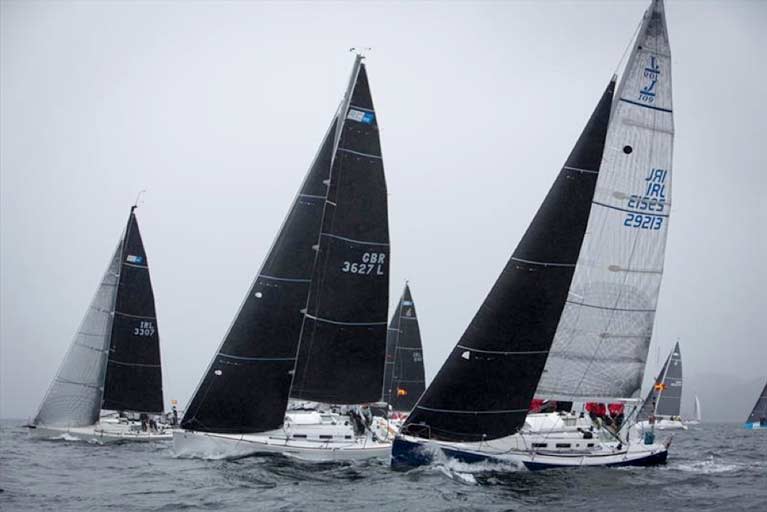 Irish Boats at 2019 Scottish series RC 35 class Photo: Marc Turner
Irish Boats at 2019 Scottish series RC 35 class Photo: Marc Turner
Wave Regatta
Only a new event in 2018 and is based around the Howth Yacht Club traditional June Bank Holiday Lambay Race. Wave Regatta is held every two years and if 2018 is anything to go by, it will be very well attended in 2020. It comes just a few days after the end of Scottish Series. A variety of courses over the three days, including the very popular round Lambay race. Well organised with great onshore facilities.
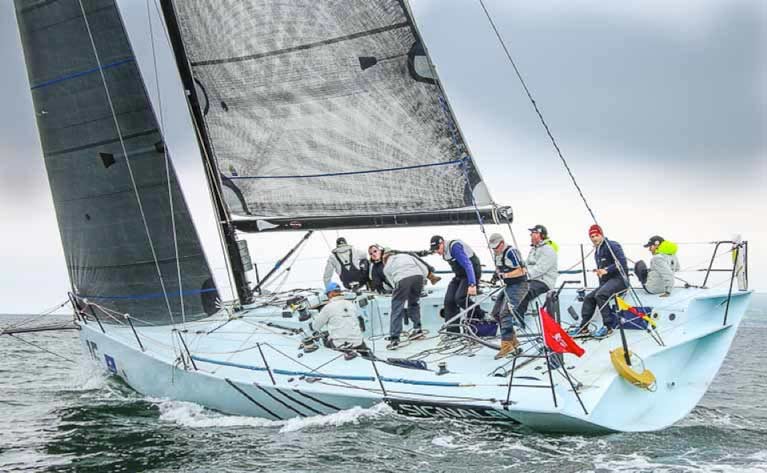 Jamie Mc William's Ker 40, Signal 8 at Howth's Wave Regatta 2018 Photo: Afloat
Jamie Mc William's Ker 40, Signal 8 at Howth's Wave Regatta 2018 Photo: Afloat
Round Ireland Race
The big one. 704 miles from Wicklow to Wicklow, clockwise around Ireland and its islands, turning corners all the way around. It goes from strength to strength. There is a rumour of a very large, very well known Maxi looking at taking on the challenge and the record in 2020. If you only plan to do one full-length offshore race, this is the one to do. I have done five Fastnet Races and I would always pick a Round Ireland over a Fastnet.
For those boats who have competed in the last two events, there is the added bonus of the chance to win a Volvo car for the best Boat over the 2016, 2018 and 2020 races. I’m sure we will be advised of the current pecking order very soon on this.
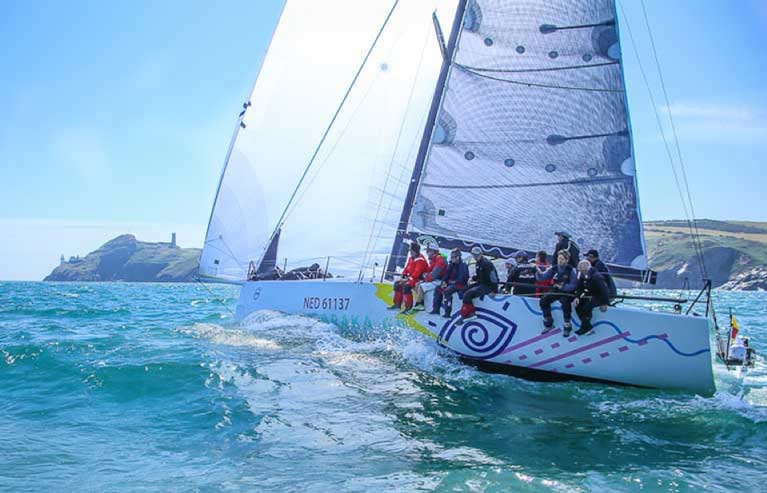 Niall Dowling's Royal Irish Yacht club, Ker 43, Baraka GP, the overall winner of the Round Ireland 2018 Photo: Afloat
Niall Dowling's Royal Irish Yacht club, Ker 43, Baraka GP, the overall winner of the Round Ireland 2018 Photo: Afloat
RORC's Morgan Cup
Rarely do Flagship RORC races end in Ireland, but on the 300th year anniversary of the founding of the Royal Cork Yacht Club, the RORC have graciously organised for one of their big races to finish in Cork, as a way of getting UK boats over for the Cork Week 300 regatta.
Approx 90 boats competed in the 2019 Morgan Cup edition this year, won overall by a J109. I suspect you may see some offshore orientated Irish boats decide to include this race in their calendar next year, which also serves as a way to get the boat to Cork in time for the Cork Week 300 Series.
Cork Week 300
From the Height of Cork Week in 2000 when boats competing topped 700, it has fallen somewhat. However, 2020, the 300th Anniversary of the club's founding, is all set to be special and interest from all corners of the world is evident with housing around Crosshaven and Carrigaline already starting to be booked up.
A number of classes are planning to use the week as their European Championships. The 1720 class, who had circa 75 boats at their 2000 event, are planning a big show in 2020 with already 10 boats confirmed from the UK with more likely to follow. A proper event Announcement is expected in September announcing some major classes and profile boats that will be competing.
The 2020 ICRA Nationals is being held as part of Cork week (three days only). Cork Week also incorporates a building fleet for the Beaufort Cup, which is a separate event within the week for associated national services (Army, Naval, Police, Firefighting, Coast Guard etc). This event incorporates an offshore race around the Fastnet and back.
Cork Week 2020 will be one not to miss. White Sail and coastal fleets will be included and the highlight is the all in Harbour race.
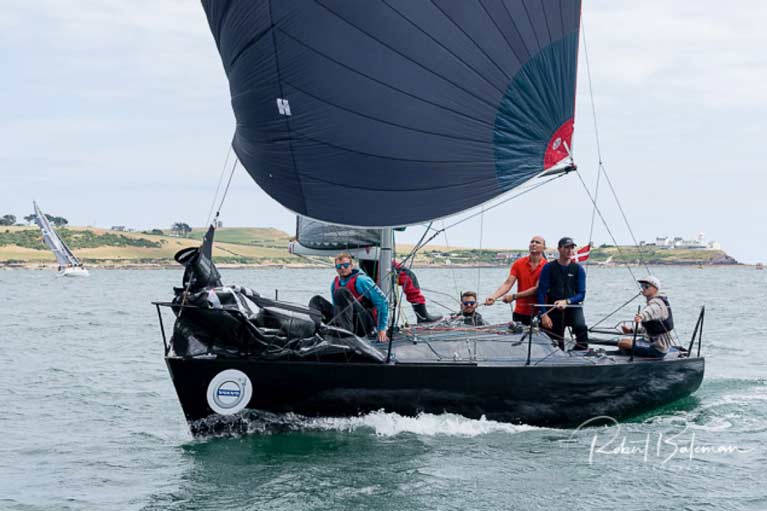 Rory Fekkes from Carrigfergus SC, First Class 8—FN-GR8—Overall Winner of Cork week 2018 Photo: Bob Bateman
Rory Fekkes from Carrigfergus SC, First Class 8—FN-GR8—Overall Winner of Cork week 2018 Photo: Bob Bateman
Calves Week
Numbers have held up very well for Calves Week. In 2019, there were 65 cruisers competing, with very competitive racing over the four days. A mix of windward-leeward courses, around the Islands and the Fastnet race keeps everyone interested. One race a day, with all the crews congregating after racing out in the streets between Newmans and Hackett's pubs. The Apres racing is as important as the racing with many sailors choosing to incorporate family holidays into the week. If you are doing Cork Week, and have not done Calves Week before, maybe you should consider leaving the boat in Cork and sliding down westwards a week or two later.
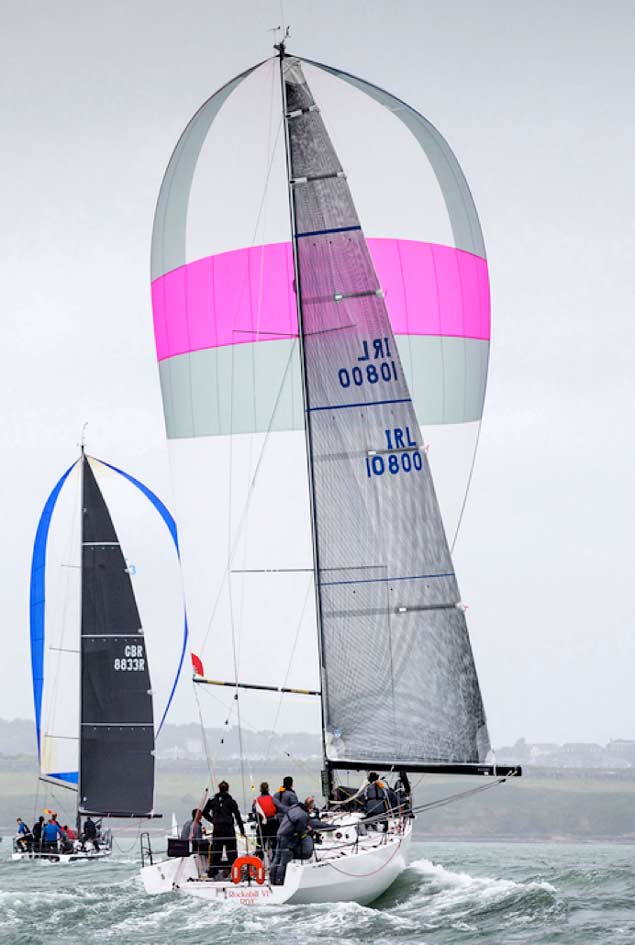 Paul O'Higgins Rockabill VI from the Royal Irish—Winner of Calves week Class One in 2019
Paul O'Higgins Rockabill VI from the Royal Irish—Winner of Calves week Class One in 2019


























